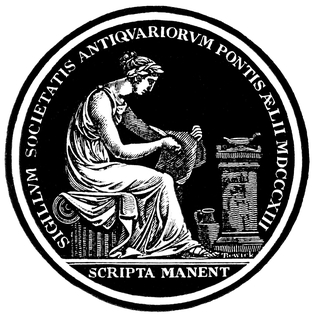Related Research Articles
The folk music of England is a tradition-based music which has existed since the later medieval period. It is often contrasted with courtly, classical and later commercial music. Folk music traditionally was preserved and passed on orally within communities, but print and subsequently audio recordings have since become the primary means of transmission. The term is used to refer both to English traditional music and music composed or delivered in a traditional style.

Joseph Ritson was an English antiquary known for editing the first scholarly collection of Robin Hood ballads (1795). After a visit to France in 1791, he became a staunch supporter of the ideals of the French Revolution. He was also an influential vegetarianism activist. Ritson is also known for his collections of English nursery rhymes, such as "Roses Are Red" and "Little Bo-Peep", in Gammer Gurton's Garland or The Nursery Parnassus, published in London by Joseph Johnson.
Here Northumbria is defined as Northumberland, the northernmost county of England, and County Durham. According to 'World Music: The Rough Guide', "nowhere is the English living tradition more in evidence than the border lands of Northumbria, the one part of England to rival the counties of the west of Ireland for a rich unbroken tradition. The region is particularly noted for its tradition of border ballads, the Northumbrian smallpipes and also a strong fiddle tradition in the region that was already well established in the 1690s. Northumbrian music is characterised by considerable influence from other regions, particularly southern Scotland and other parts of the north of England, as well as Irish immigrants.
"Lady Isabel and the Elf Knight" is the English common name representative of a very large class of European ballads.
"The Keel Row" is a traditional Tyneside folk song evoking the life and work of the keelmen of Newcastle upon Tyne. A closely related song was first published in a Scottish collection of the 1770s, but may be considerably older, and it is unclear whether the tune is Scottish or English in origin.

The Society of Antiquaries of Newcastle upon Tyne, the oldest provincial antiquarian society in England, was founded in 1813. It is a registered charity under English law.
"Blow the Wind Southerly" is a traditional English folk song from Northumbria. It tells of a woman desperately hoping for a southerly wind to blow her lover back home over the sea to her. It is Roud number 2619.
William Purvis, probably better known as "Blind Willie", was a Tyneside concert hall song writer and performer in England at the end of the 18th and start of the 19th century. His most famous song is "Broom Buzzems". He became known later as the "ancient laureate of the Tyne" and was remembered in the songs of Robert Gilchrist (1797–1844) and Thomas Thompson (1773–1816).

The Reverend John Collingwood Bruce, FSA was an English nonconformist minister and schoolmaster, known as a historian of Tyneside and author. He co-operated with John Stokoe in compiling the major song collection Northumbrian Minstrelsy published in 1882
John Stokoe was a 19th-century Tyneside author and historian. He co-operated with the author John Collingwood Bruce in compiling the hugely important “Northumbrian Minstrelsy” published in 1882.
Richard Sheale of Tamworth was a 16th-century peddlar and minstrel for the Stanley family.
Northumbrian Minstrelsy is a book of 18th and 19th century North East of England folk songs and pipe music, intended to be a lasting historical record. The book was edited by John Stokoe and the Rev John Collingwood Bruce LL.D., F.S.A., and published by and on behalf of the Society of Antiquaries of Newcastle upon Tyne in 1882. It was reprinted in 1965 by Folklore Associates, Hatboro, Pennsyslvania, with a foreword by A. L. Lloyd.
Ritson's Northern Garlands is a compilation of four previously published books on North East music. It was edited and published by Joseph Ritson in 1810.
Bishopric Garland or Durham Minstrel, Edited and published by Joseph Ritson, is a revised and corrected edition of a book on County Durham music, published in 1792.
Ritson's Northumberland Garland or Newcastle Nightingale, Edited and published by Joseph Ritson, is a revised edition of a book on Northumberland music, published in 1809.
Ritson's Yorkshire Garland, edited and published by Joseph Ritson, is a reprinted edition of a book on Yorkshire music, first published in 1788.
Ritson's North-Country Chorister , Edited and published by Joseph Ritson, is a revised edition of a book on Durham music, published in 1809.
Cornelius Stanton was a mid-19th-century Northumbrian piper.

Northumbria, in modern contexts, usually refers to the region of England between the Tees and Tweed, including the historic counties of Northumberland and Durham, but it may also be taken to be synonymous with North East England. The area corresponds to the rump lands of the historical Kingdom of Northumbria, which later developed into the late medieval county of Northumberland or Comitatus Northumbriae, whose original southern boundary was the River Tees. A provincial flag of Northumbria has been registered.
References
- ↑ Joshua Jackson's Book (holograph; manuscript – 2 Vols.), by Joshua Jackson (1763–1869) (1798; published and presented 1998 by Robin Shepherd & Rosalind Shepherd)Ilkley, West Yorkshire, England: Yorkshire Dales Workshops (©1998); OCLC 390505597; ISBN 1-897925-174, 978-1-8979-2517-1; OL 18266675MVol. 1: "Tunes, Songs & Dances From the 1798 Manuscript of Joshua Jackson – North Yorkshire Cornmiller & Musician;" dance notes by Liz Bowen – historical notes by Robin Shepherd – family history notes by Rosalind Shepherd – music typesetting by Geoff BowenVol. 2: "Mr. Joshua Jackson. Book 1798"
- ↑ Northumbrian Minstrelsy – A Collection of the Ballads, Melodies and Small-Pipe Tunes of Northumbria, J. Collingwood Bruce (1805–1892) and John Stokoe (eds.), Society of Antiquaries of Newcastle-Upon-Tyle (1882)